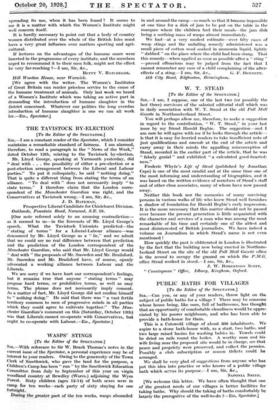W. T. STEAD [To the Editor of the SPECTATOR.] SIR, —I
am, I suppose, one of the last two (or possibly the last three) survivors of the salaried editorial staff which was in daily association with W. T. Stead at the old Pall Mall Gazette in Northumberland Street.
You will perhaps allow me, therefore, to make a suggestion in regard to the contribution, " W. T. Stead," in your last issue by my friend Harold Begbie. The suggestion—and I am sure he will agree with me if he looks through the article— is that it is easy for hurried readers to take insufficient note of just qualifications and amende at the end of the article and carry away in their minds the appalling misconception of Stead, recorded in the earlier part of the article, that he was " falsely genial " and exhibited " a calculated good-hearted- ness."
Frederic Whyte's Life of Stead (published by Jonathan Cape) is one of the most candid and at the same time one of the most informing and understanding of biographies, and it was based on the written evidence of members of Stead's staff and of other close associates, many of whom have now passed away.
Neither this book nor the memories of many surviving persons in various walks of life who knew Stead well furnishes a shadow of foundation for Harold Begbie's early impression. It is the more necessary that this matter should not be passed over because the present generation is little acquainted with the character and services of a man who was among the most remarkable of his time and certainly one of the ablest and most disinterested of British journalists. We have indeed a volume on Journalism in which Stead's name is not even mentioned !
How quickly the past is obliterated in London is illustrated by the fact that the building now being erected in Northum- berland Street on the site of the old Pall Mall Gazette office is the second to occupy the ground on which the P.M.G. office Stead worked in stood.—I am, Sir, &c., J. W. ROBERTSON SCOTT.
" Countryman" Office, Idbury, Hingham, Oxford.






























































 Previous page
Previous page